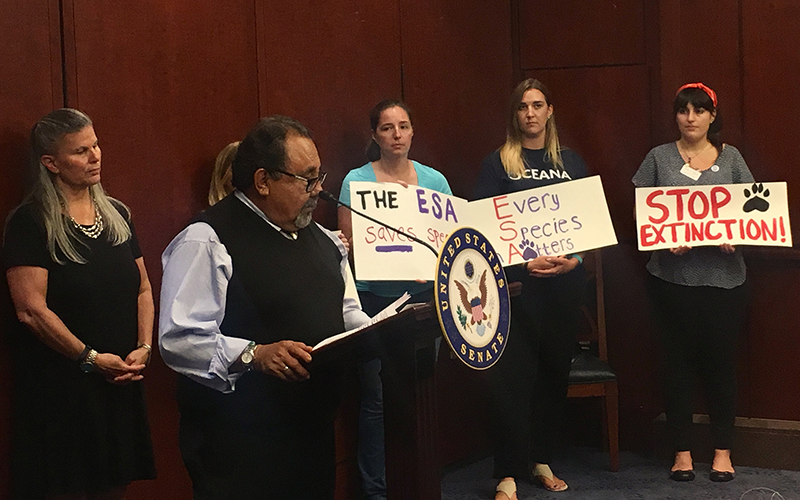WASHINGTON – Democratic lawmakers said Wednesday that Trump administration efforts to revamp the Endangered Species Act disregard science and ignore the impact that climate change is having on wildlife and their habitats.
The House and Senate members were pushing back against plans by Republicans, who say the act is no longer useful and needs to be modernized – efforts that Democrats claim will do nothing more than gut the law.
“The Trump administration has made no secret, from the beginning, that it was out to undermine and dismantle our laws,” said Rep. Raul Grijalva, D-Tucson. “Our laws that protect our environment, our public lands, our wildlife and future generations.”
Grijalva said those future generations are driving the fight to save the Endangered Species Act, because preservation of the nation’s wildlife is the best thing Americans can pass along through the years.
“Part of why we do what we do, and you do what you do, is that we need to pass something on to a generation,” he said. “And what better of a little symbol of our nation and our values than to bequeath to them the wildlife we enjoy and see and feel.”
But House Republicans in the Congressional Western Caucus said the 45-year-old act is not achieving its goal of saving species and it needs to be updated. Caucus members introduced a package of bills this summer that Rep. Paul Gosar, R-Prescott, said would “bring this law into the 21st century.”
Those bills include one by Gosar, the chairman of the caucus, that would restrict the designation of critical habitats on reservoirs or other water storage areas. Another, introduced by Rep. Andy Biggs, R-Gilbert, would set specific policies under which the government has to remove a species from the endangered or threatened list.
“In order to better protect species, we must treat property owners, states and local stakeholders as partners rather than obstacles,” Gosar said in a prepared statement Wednesday.
“Modernizing this Act will allow us to start making policy decisions based on science that is standardized, transparent and publicly available,” his statement said.
Democrats, however, argue that the Republicans’ plans disregard science, instead looking at cost calculations of big corporations and letting money drive their decisions.
“They want to say that climate change and other clear long-term scientific trends are not a foreseeable impact on species, reducing protections for species like the polar bear,” said Sen. Tom Udall, D-New Mexico. “Well, we’re here to tell them not on our watch.”
They said the Endangered Species Act is one of the more bipartisan pieces of legislation on the Hill – it passed with unanimous Senate approval in 1973. But Udall said environmental protections are not safe in today’s political climate, regardless of their success rates.
“For more than 40 years, the Endangered Species Act has been a pillar of environmental protection,” he said. “But as we have seen time and time again, no environmental protection, no matter how effective or popular it is, is safe from the Trump administration or from this Republican Congress.”
Grijalva pointed to a Native American proverb that he said applies in the current situation.
“It goes, ‘Never go to sleep while your meat’s on the fire,'” he said. “I think our meat’s on the fire and we shouldn’t go to sleep. We have some work to do.”
